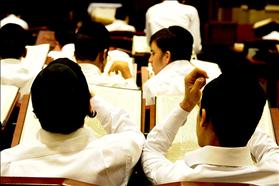What's bad for us is bad for Israel
Report: Haredi employment is down; Haredi poverty is up
Data from the Israel Democracy Institute's 2018 Statistical Report on Ultra-Orthodox Society in Israel supports Hiddush's data and analysis on the growing trend of ultra-Orthodox men studying in yeshivas instead of entering the workforce, as poverty rates rise.
Sagi Agmon 21/12/2018 00:05
Tags: Israel Democracy Institute · ultra-Orthodox unemployment · ultra-Orthodox poverty · unemployment · poverty · Haredi

Yeshiva students, source: Wikipedia
The national policy toward the Haredi public suffers from a split personality. On the one hand, the government recognizes that the fact that approximately 120,000 yeshiva students in Israel do not work and rely on growing state subsidies is a mortal blow to the Israeli economy and to the social security of the general public. It sets targets for Haredi employment and invests large sums in this. On the other hand, due to coalition constraints, the government increases incentives for yeshiva students, pushing them out of the labor market and locking their families into the cycle of poverty.
The numbers speak for themselves. In 2013-2015, when support for yeshiva students was cut, the employment rate of ultra-Orthodox men jumped from 45% to 54%. The current government has increased its yeshiva budget to an all-time high of NIS 1.25 billion and returned the income subsidies to the ultra-Orthodox (In the name of "Economic Aid for Needy Torah Students.")
The results were immediate: In 2015, the number of working haredi men declined to 51%. Data from Israel’s Central Bureau of Statistics for the third quarter of 2018 show another significant drop to 47.8%. Two years of increased support in yeshivas were sufficient to reduce Haredi men's employment to below 50 percent, and there is no reason to assume that the downward trend will stop. The government’s target of 63% employment by 2020 seems like a distant dream.
The drop in the employment of men is directly related to the increase in poverty among the ultra-Orthodox. It was precisely during the bitter years of the "Yair Lapid decrees" that many Haredim (men and women) were forced into the labor market, and the extent of poverty in the ultra-Orthodox sector declined. Incidentally, this phenomenon was also measured by the Bank of Israel following the cutback in support for children carried out by Benjamin Netanyahu in the early 2000s, when he served as Israel’s Finance Minister. The men's return to the yeshivas stopped this trend, and last year, despite unprecedented transfer payments, the poverty rate in the ultra-Orthodox sector rose to 45.1%. The poverty figures for 2018 have not yet been published, but it can be assumed that they will constitute further confirmation of the connection between the return of men to yeshivas and the deepening of poverty among the ultra-Orthodox public.
The Israeli government prefers to ignore the fact that most ultra-Orthodox education for boys does not even meet the minimum level of core studies required by law (and ends entirely by ninth grade). Later, providing government benefits for yeshiva students and their families makes entering the workforce a poor economic decision.
The Israeli government prefers to ignore the fact that most ultra-Orthodox education for boys does not even meet the minimum level of core studies required by law (and ends entirely by ninth grade). Later, providing government benefits for yeshiva students and their families makes entering the workforce a poor economic decision.
The Ministry of Economy invests tens of millions a year in vocational training for the ultra-Orthodox. The IDF invests hundreds of millions in developing special routes to employment. The academy allows for studies segregated by gender, despite the strong opposition among the public and among the faculty. The government grants affirmative action for the absorption of Haredim into public service. Education Minister Bennett recognized Torah studies as equivalent to an academic degree. But despite all of this, the percentage of working Haredi men is dropping, and the number of yeshiva students is exploding.
The reason is simple:these hundreds of millions are a fraction of the total payments that the State of Israel transfers to ultra-Orthodox schools and ultra-Orthodox institutions, where the scope of secular studies is minimal, and later on to yeshivas that provide a monthly stipend to those studying there. This continues, while university students in Israel pay tuition that grows from year to year and are forced to fight for scholarships and loans, which only a few weeks ago were cut by 45 million shekels. A significant portion of this sum, incidentally, was transferred to finance the coalition’s religious needs.
In Haredi politics and journalism there is almost unanimous agreement that the current government is the best that the ultra-Orthodox have ever had, but from an objective perspective it is the opposite. What ultra-Orthodox politicians call "the unprecedented flourishing of the Torah world" is the picture of the rapid decline in the employment of haredi men. The government, as a gift to the ultra-Orthodox politicians, is pushing more and more Haredi families into the cycle of poverty. This is bad for the State of Israel, this is bad for the ultra-Orthodox public.